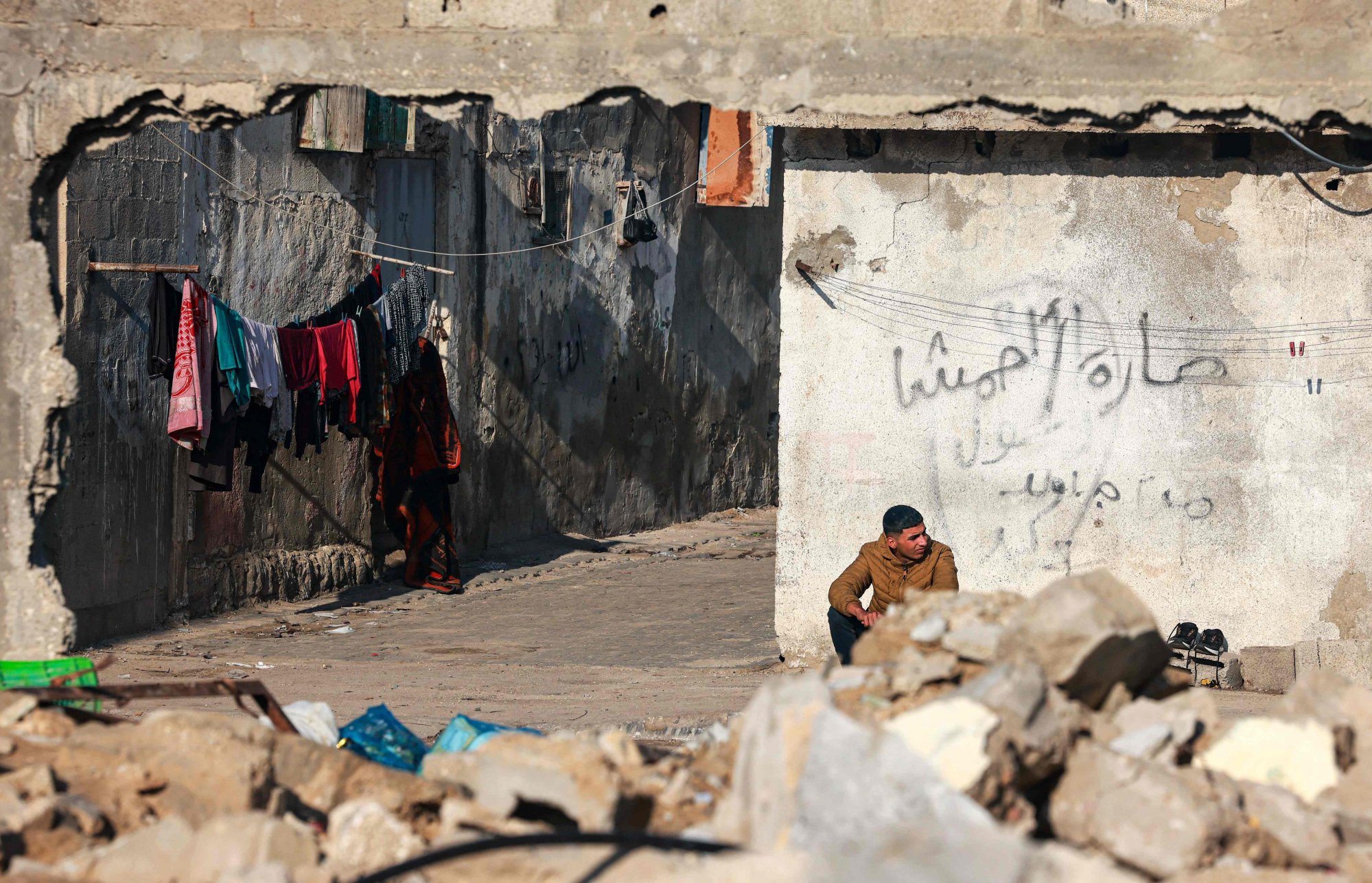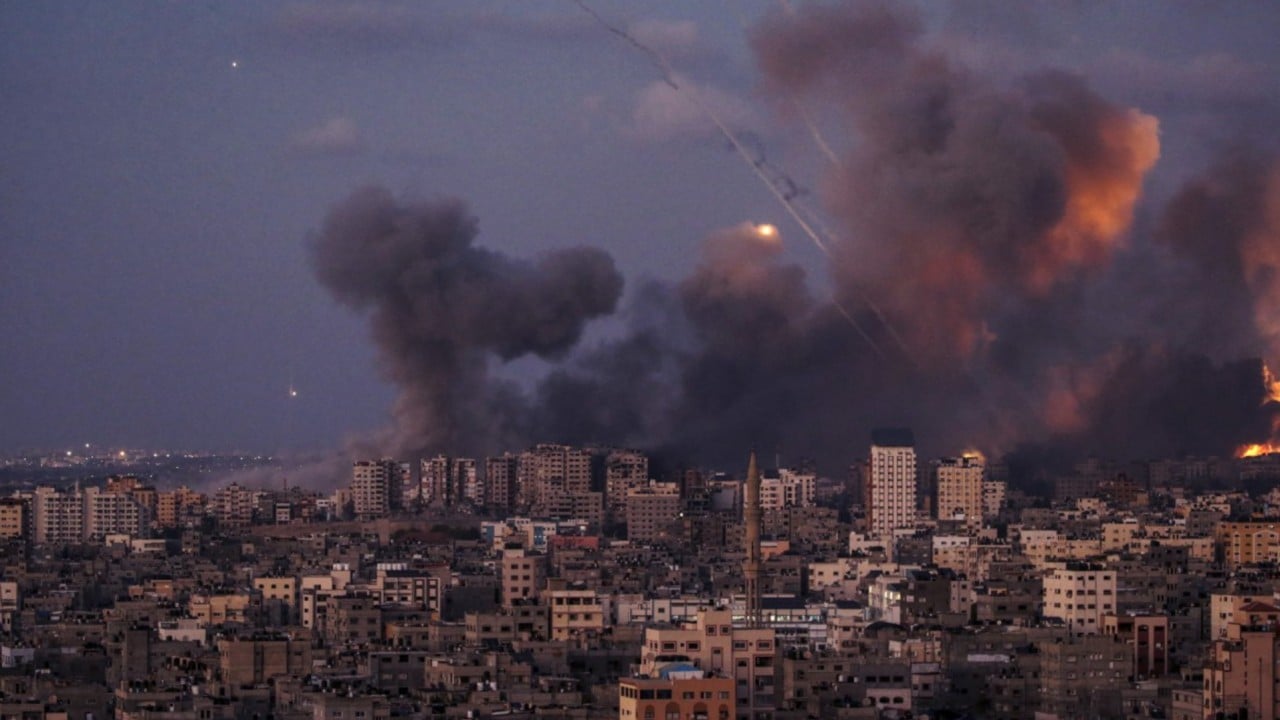
Rights group calls Israel’s ‘starvation’ tactic in Gaza an ‘abhorrent war crime’, as US looks to next phase of war
- Human Rights Watch accuses Israel of trying to starve people in the Gaza Strip, saying: ‘World leaders should be speaking out against this abhorrent war crime’
- US Defence Secretary Lloyd Austin arrived in Israel on Monday and is expected to discuss Israel’s planning for a transition to the next phase of the war
A global rights group accused Israel on Monday of committing a war crime by starving people in the Gaza Strip who continued to face relentless attacks in the war with Hamas militants.
Prime Minister Benjamin Netanyahu has vowed no let-up in the bombardment and siege of the densely-populated coastal enclave, where buildings lie in ruins, hunger is rife, and health authorities say around 19,000 Palestinians have been killed.
Despite rising global pressure to protect civilians, who have nowhere to go, Israel is bent on eliminating the Hamas group behind an October 7 rampage that killed 1,200 people and took 240 hostages, according to Israeli authorities.
The Israeli government is using starvation of civilians as a method of warfare in the occupied Gaza Strip
US-based Human Right Watch (HRW) said Israeli forces were deliberately blocking delivery of water, food and fuel, razing agricultural areas and depriving Gaza’s 2.3 million people of objects indispensable for their survival.
“The Israeli government is using starvation of civilians as a method of warfare in the occupied Gaza Strip,” it said in a report. “World leaders should be speaking out against this abhorrent war crime.”
There was no immediate response to the HRW report from Israel, which has denied targeting civilians and says it is trying to facilitate aid to innocents while choking off supplies to thousands of Hamas fighters operating from tunnels.
Deaths mount
The HRW report came after Pope Francis accused Israel of “terrorism”, deploring the reported killing by the Israeli military of two Christian women in a church complex.
Israel has not responded to his comments.
In the latest bombardments, 90 Palestinians died in the Jabilia refugee camp in northern Gaza on Sunday, according to the Hamas-run territory’s health ministry. Hamas Aqsa radio reported an attack on Gaza’s main hospital, Al Shifa.
In Deir al-Balah, central Gaza, doctors said 12 Palestinians had been killed and dozens wounded, while in Rafah in the south, an Israeli air strike on a house left at least four people dead.
The sound of the explosion was “as powerful as an earthquake”, Mahmoud Jarbou, who lives nearby, told Reuters.
An Israeli tank shell hit the maternity building inside Nasser Hospital in Khan Younis, killing a 13-year-old girl named Dina Abu Mehsen, according to Gaza health ministry spokesman Ashraf Al-Qidra.
Al-Qidra said that Abu Mehsen had previously lost her father, mother, two of her siblings, and one of her legs during a previous shelling.
The Israeli military released the names of four more soldiers killed in combat in Gaza, making it 126 dead in the strip since its ground invasion began in late October.
Aid needed
Residents reported gunfire between Israeli soldiers and Hamas fighters in various spots up and down narrow, coastal Gaza, with the militants saying they had launched a series of attacks.
Reuters was unable to verify the state of operations or claims from either side.
With Gazans desperate for basics, the Kerem Shalom crossing between Israel and Gaza has opened for aid trucks for the first time since the outbreak of war, officials said, adding to some supplies coming in via the Rafah crossing with Egypt.
The United Nations Security Council could vote on Monday on a proposal to demand that Israel and Hamas allow better aid access – via land, sea and air – with monitoring of deliveries.
Diplomats said the draft resolution hinges on final negotiations between the United States, a close ally of Israel with veto power in the council, and the United Arab Emirates, which has drafted the text.
Increased violence also continued in the occupied West Bank, where four Palestinians were killed in an ongoing Israeli army raid on the Faraa refugee camp, the Palestinian health ministry said on Monday.
US defence chief to look to next phase of Gaza war
US Defence Secretary Lloyd Austin arrived in Israel on Monday for talks expected to focus on Israel’s eventual end to high intensity war in Gaza and its transition to a more limited, focused conflict, officials say.
A senior US defence official told reporters travelling with Austin that he was expected to discuss Israel’s planning for a transition to the next phase of the war in his talks with senior Israeli leaders, including Prime Minister Benjamin Netanyahu and Defence Minister Yoav Gallant.
“What you see in terms of the high-intensity ground operations, plus air strikes, today is not going to go on forever. It’s one phase of a campaign,” the official said.
“We have an interest in supporting the Israelis in planning for what a transition looks like when they make the decision that major ground operations should end and they’re ready to transition.”
Michael Eisenstadt, director of the Military and Security Studies Program at the Washington Institute for Near East Policy, said both the US and Israel seemed to agree on an eventual transition to a next phase of the campaign.
But Washington wants that to happen sooner, perhaps in a few weeks, while Israel feels it needs more time, he said.
“So they are in basic agreement about the way ahead, and the need to eventually transition to a more targeted approach, but there are differences regarding the timeline,” he said.
When US National Security Adviser Jake Sullivan visited Israel last week, Netanyahu told him Israel would fight “until absolute victory”. Defence Minister Yoav Gallant said the war would “last more than several months”.
With fierce ground fighting having expanded this month across the length of the Gaza Strip and aid organizations warning of a humanitarian catastrophe, Biden said last week that Israel risked losing international support because of “indiscriminate” air strikes killing Palestinian civilians.

In a sign of the Biden’s administration’s intense focus on the Israel-Gaza conflict, Austin will be accompanied in Israel by the chairman of the US military’s Joint Chiefs of Staff, Air Force General Charles “C.Q.” Brown.
Austin and Brown are also grappling with regional fallout from the war, with Iran-aligned groups carrying out waves of attacks against US troops in Iraq and Syria and Yemen’s Houthi movement striking vessels in the Red Sea in support of Hamas.
The Iranian-backed Houthis said over the weekend they had attacked the Israeli Red Sea resort of Eilat with a swarm of drones.
The US Central Command said the destroyer Carney on Saturday shot down 14 Houthi drones over the Red Sea. Britain also said one of its warships had shot down a suspected attack drone targeting merchant shipping.


